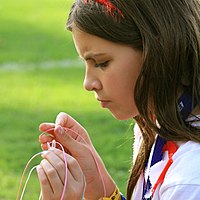
A failure to show the efficacy of a dot-probe attentional training in dysphoria: Evidence from an eye-tracking study.
Sign Up to like & getrecommendations! Published in 2018 at "Journal of clinical psychology"
DOI: 10.1002/jclp.22652
Abstract: OBJECTIVE This study examines whether a 4-day dot-probe attentional training to orient attention toward positive words could lead participants with dysphoria to change selective attention to emotional faces. It was also explored whether this positive… read more here.
Keywords: show; training; probe attentional; dot probe ... See more keywords

Improving the psychometric properties of dot-probe attention measures using response-based computation.
Sign Up to like & getrecommendations! Published in 2018 at "Journal of behavior therapy and experimental psychiatry"
DOI: 10.1016/j.jbtep.2018.01.009
Abstract: BACKGROUND AND OBJECTIVES Abnormal threat-related attention in anxiety disorders is most commonly assessed and modified using the dot-probe paradigm; however, poor psychometric properties of reaction-time measures may contribute to inconsistencies across studies. Typically, standard attention… read more here.
Keywords: psychometric properties; attention measures; attention; dot probe ... See more keywords

Optimizing Quantum Dot Probe Size for Single-Receptor Imaging.
Sign Up to like & getrecommendations! Published in 2020 at "ACS nano"
DOI: 10.1021/acsnano.0c02390
Abstract: Quantum dots (QDs) are nanocrystals with bright fluorescence and long-term photostability, attributes particularly beneficial for single-molecule imaging and molecular counting in the life sciences. The size of a QD nanocrystal determines its physicochemical and photophysical… read more here.
Keywords: single molecule; quantum dot; optimizing quantum; size ... See more keywords

On the relative sensitivity of spatial and nonspatial measures of attentional bias: Emotion-induced blindness, the dot probe, and gradations in ratings of negative pictures.
Sign Up to like & getrecommendations! Published in 2021 at "Emotion"
DOI: 10.1037/emo0000855
Abstract: Attentional biases toward negative information are implicated in various emotional disorders. The literature probing this relationship relies on assumptions that the tasks used to measure attentional biases are sensitive to the negative emotional qualities of… read more here.
Keywords: sensitivity; dot probe; induced blindness; emotion induced ... See more keywords

Testing the automaticity of an attentional bias towards predictive cues in human associative learning
Sign Up to like & getrecommendations! Published in 2019 at "Quarterly Journal of Experimental Psychology"
DOI: 10.1177/1747021819897590
Abstract: It is well established that associative learning, such as learning new cue–outcome pairings, produces changes in attention: cues that are good predictors of relevant outcomes become prioritised compared with those that are non-predictive or redundant.… read more here.
Keywords: attentional bias; task; attention; dot probe ... See more keywords

Threat-Related Attentional Biases in Police Officers and Martial Artists: Investigating Potential Differences Using the E-Stroop and Dot Probe Task
Sign Up to like & getrecommendations! Published in 2017 at "SAGE Open"
DOI: 10.1177/2158244017712776
Abstract: In this study, we investigated the possible development of threat-related attentional bias due to the work as a police officer. For this purpose, we compared four groups, differing with regard to their experience in policing… read more here.
Keywords: task; threat related; police officers; related attentional ... See more keywords

A Pictorial Dot Probe Task to Assess Food-Related Attentional Bias in Youth With and Without Obesity: Overview of Indices and Evaluation of Their Reliability
Sign Up to like & getrecommendations! Published in 2021 at "Frontiers in Psychology"
DOI: 10.3389/fpsyg.2021.644512
Abstract: Several versions of the dot probe detection task are frequently used to assess maladaptive attentional processes associated with a broad range of psychopathology and health behavior, including eating behavior and weight. However, there are serious… read more here.
Keywords: attentional bias; task; dot probe; reliability ... See more keywords

The Study of Security Priming on Avoidant Attentional Biases: Combining Microsaccadic Eye-Movement Measurement With a Dot-Probe Task
Sign Up to like & getrecommendations! Published in 2021 at "Frontiers in Psychology"
DOI: 10.3389/fpsyg.2021.726817
Abstract: Microsaccades are small fixational eye movements that have shown to index covert attentional shifts. The present experiment combined microsaccades with performance measures from a dot-probe task to study influences of attachment security priming on the… read more here.
Keywords: probe task; dot probe; security priming; probe ... See more keywords

Attentional Bias Is Associated with Negative Emotions in Problematic Users of Social Media as Measured by a Dot-Probe Task
Sign Up to like & getrecommendations! Published in 2022 at "International Journal of Environmental Research and Public Health"
DOI: 10.3390/ijerph192416938
Abstract: Objective: Social media (SM) have flourished and are affecting human lives on an unprecedented scale. Problematic social media use (PSMU) is a recently emerging problematic behavior that affects both physical and mental health. The purpose… read more here.
Keywords: social media; dot probe; attentional bias; task ... See more keywords